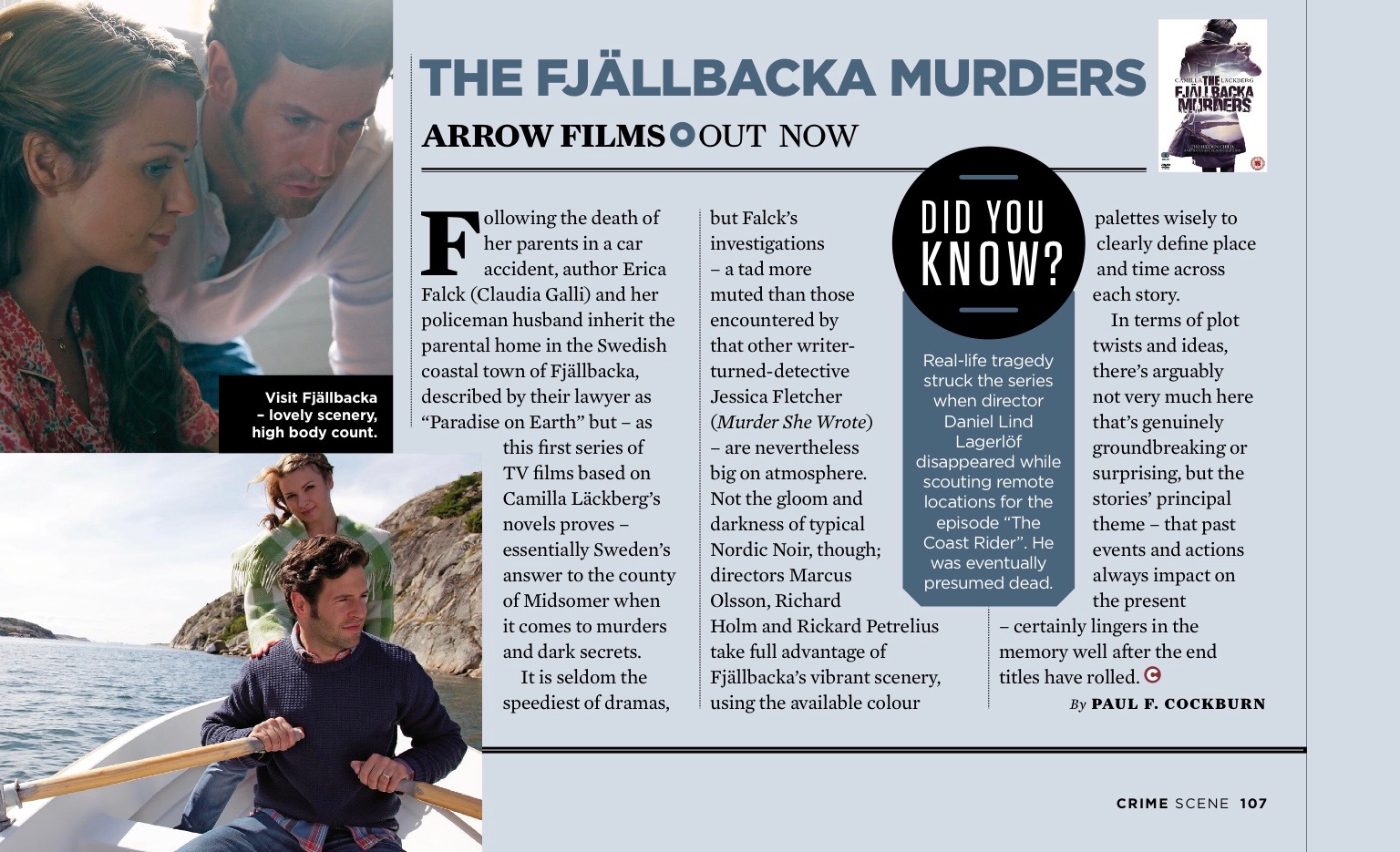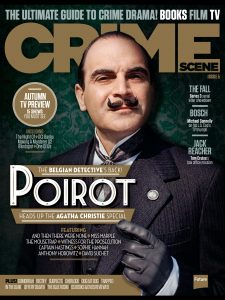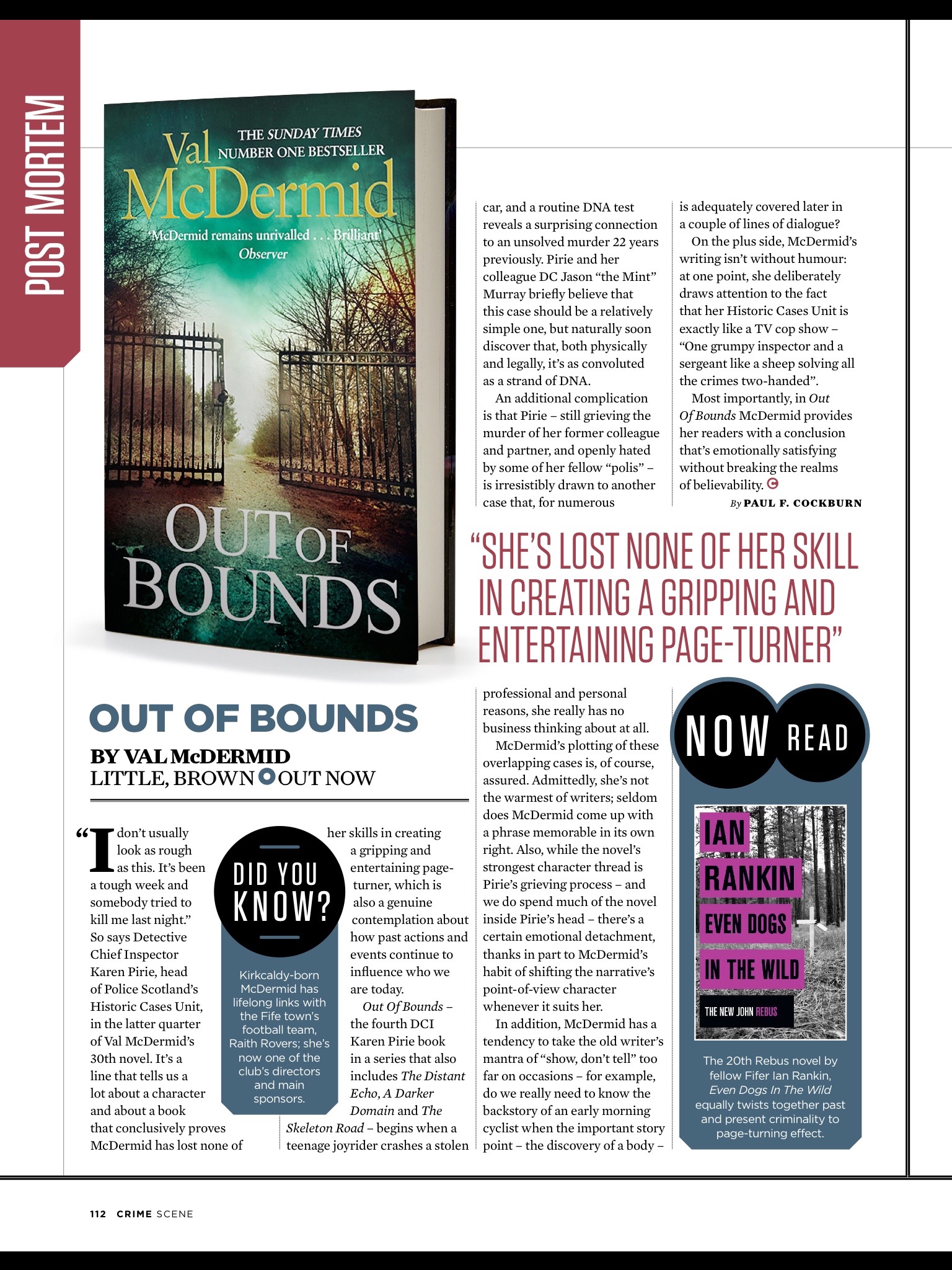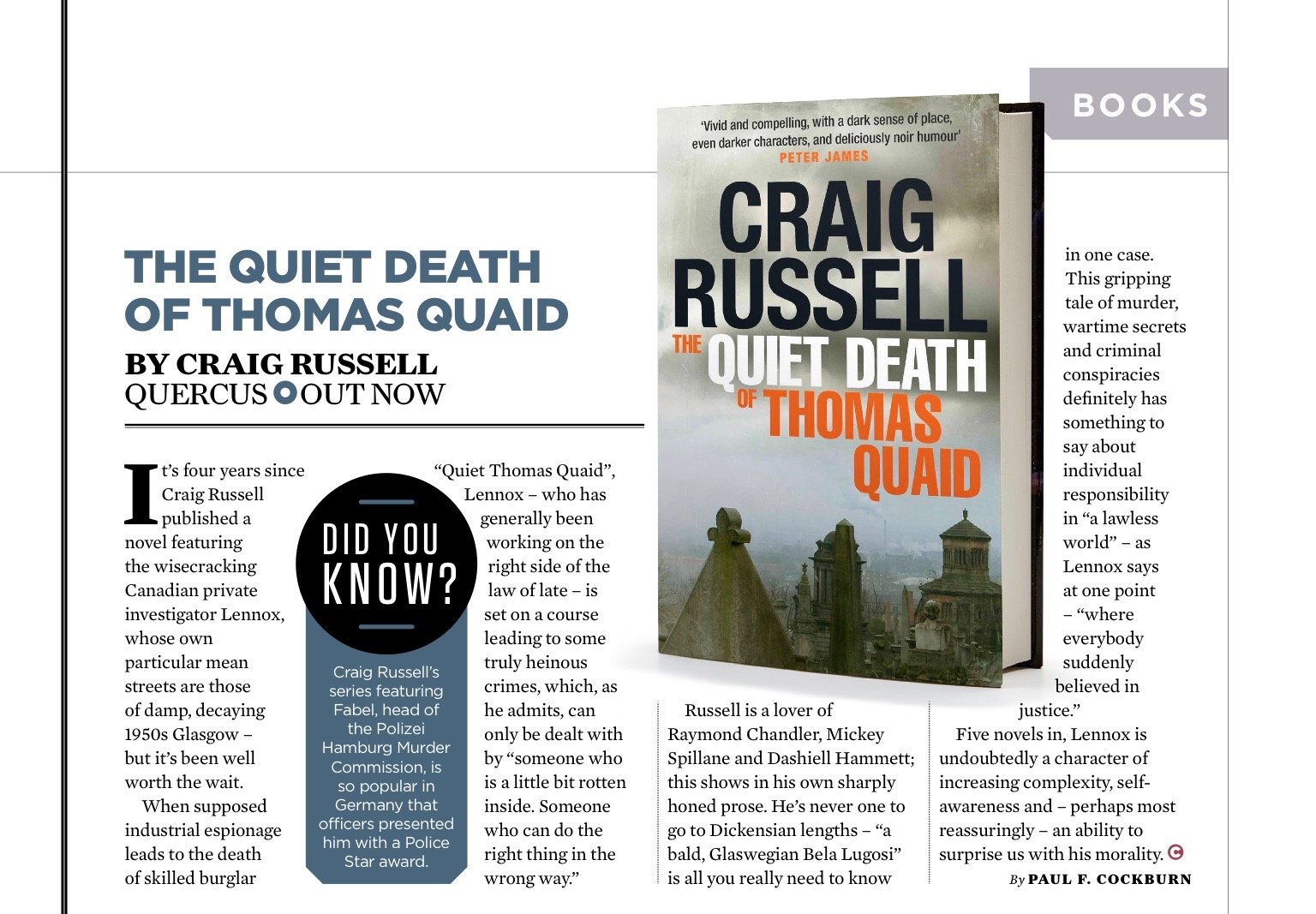First published in Crime Scene #5.

THE FJÄLLBACKA MURDERS
(Arrow Films) Out Now
Following her parents’ deaths in a car accident, author Erica Falck (Claudia Galli) and her policeman husband inherit the parental home in the Swedish coastal town of Fjällbacka, described by their lawyer as “Paradise on Earth” but – as this first series of TV films based on Camilla Läckberg’s novels proves – essentially Sweden’s answer to the county of Midsomer when it comes to murders and secrets.
 Seldom the speediest of dramas, Falck’s investigations – a tad more muted than those encountered by that other writer-turned-detective Jessica Fletcher (Murder She Wrote) – are nevertheless big on atmosphere. Not the gloom and darkness of typical nordic noir, though; directors Daniel Lind Lagerlöf and Rickard Petrelius take full advantage of Fjällbacka’s vibrant scenery, using the available colour palates wisely to clearly define place and time across each story.
Seldom the speediest of dramas, Falck’s investigations – a tad more muted than those encountered by that other writer-turned-detective Jessica Fletcher (Murder She Wrote) – are nevertheless big on atmosphere. Not the gloom and darkness of typical nordic noir, though; directors Daniel Lind Lagerlöf and Rickard Petrelius take full advantage of Fjällbacka’s vibrant scenery, using the available colour palates wisely to clearly define place and time across each story.
In terms of plot twists and ideas, there’s arguably little here that’s genuinely groundbreaking or surprising, but the stories’ principal theme – that past events and actions always impact on the present – certainly lingers in the memory after the titles have rolled.
DID YOU KNOW?
Tragedy struck the series when director Daniel Lind Lagerlöf disappeared while scouting remote locations for third episode “The Coast Rider”. He was eventually presumed deceased.

OUT OF BOUNDS
BY VAL McDERMID • (Publisher) Out Now
“I don’t usually look as rough as this,” she apologised. “It’s been a tough week and somebody tried to kill me last night.”
So says Detective Chief Inspector Karen Pirie, head of Police Scotland’s Historic Cases Unit, during the latter quarter of Val McDermid’s 30th novel. It’s a line that tells us a lot about a character and a book that conclusively prove McDermid has lost none of her skills in creating a gripping and entertaining page-turner that’s also a genuine contemplation about how past actions and events continue to influence who we are today.
Out of Bounds begins when a teenage joyrider crashes a stolen car, and a routine DNA test reveals a surprising connection to an unsolved murder 22 years previously. Pirie and her colleague DC Jason “the Mint” Murray briefly believe this case should be a relatively simple one, but naturally soon discover that, both physically and legally, it’s as convoluted as a strand of DNA.
An additional complication is that Pirie – still grieving the murder of her former colleague and partner Phil, and openly hated by some of her fellow “polis” – is irresistibly drawn to another case that, for numerous professional and personal reasons, she has no business thinking about at all.
McDermid’s plotting of these overlapping cases is, of course, assured. Admittedly, she’s not the warmest of writers; seldom does McDermid come up with a phrase memorable in its own right. Also, while the novel’s strongest character thread is Pirie’s grieving process – and we do spend much of the novel inside Pirie’s head – there’s a certain emotional detachment, thanks in part to McDermid’s habit of shifting the narrative’s point-of-view character whenever it suits her.
Plus, McDermid has a tendency to take the old writer’s mantra of “show, don’t tell” too far on occasions – for example, do we really need to know the backstory of an early morning cyclist when the important story point – the discovery of a body – is adequately covered later in a couple of lines of dialogue?
On the plus side, McDermid’s writing isn’t without humour: at one point, she deliberately draws attention to the fact that her Historic Cases Unit is exactly like a TV show – “One grumpy inspector and a sergeant like a sheep solving all the crimes two-handed”.
Most importantly, McDermid provides her readers with a conclusion that’s emotionally satisfying without breaking the realms of believability.
DID YOU KNOW?
Kirkcaldy-born McDermid has life-long links with the Fife town’s football team, Raith Rovers; she’s now one of the club’s directors and main sponsors.
NOW READ
Fellow Fifer Ian Rankin’s 21st Rebus novel, Rather Be The Devil (published this November) equally twists together past and present criminality to page-turning effect.

THE QUIET DEATH OF THOMAS QUAID
BY CRAIG RUSSELL • (Quercus) 4 August 2016
It’s four years since Craig Russell published a novel featuring the wisecracking Canadian private investigator Lennox, whose own particular mean streets are those of damp, decaying 1950s’ Glasgow – but it’s been well worth the wait.
When supposed industrial espionage leads to the death of skilled burglar “Quiet Thomas Quaid”, Lennox – who has generally been working on the right side of the law of late – is set on a course leading to some truly heinous crimes – which, as he admits, can only be dealt with by “someone who is a little bit rotten inside. Someone who can do the right thing in the wrong way.”
Russell’s a lover of Chandler, Spillane and Hammett; this shows in his own sharply honed prose. Never one to go to Dickensian lengths – “a bald, Glaswegian Bela Lugosi” is all you really need in one case – this gripping tale of murder, wartime secrets, and criminal conspiracies definitely has something to say about individual responsibility in a “a lawless world” – as Lennox says at one point – “where everybody suddenly believed in justice.”
Five novels in, Lennox is undoubtedly a character of increasing complexity, self-awareness and – perhaps most reassuringly – an ability to surprise us with his morality.
DID YOU KNOW?
As a child in the 1960s, Russell was a fan of US TV’s The Fugitive, starring David Janssen as “man on the run” Richard Kimble.